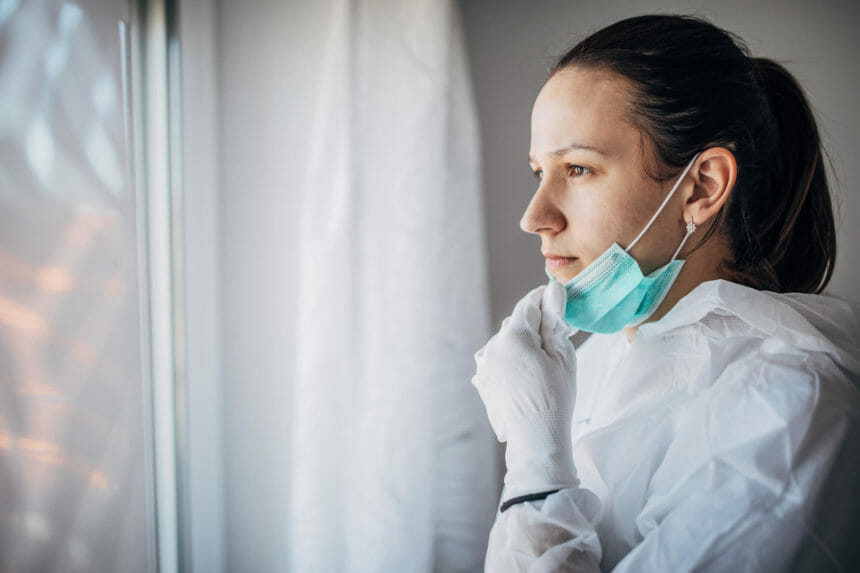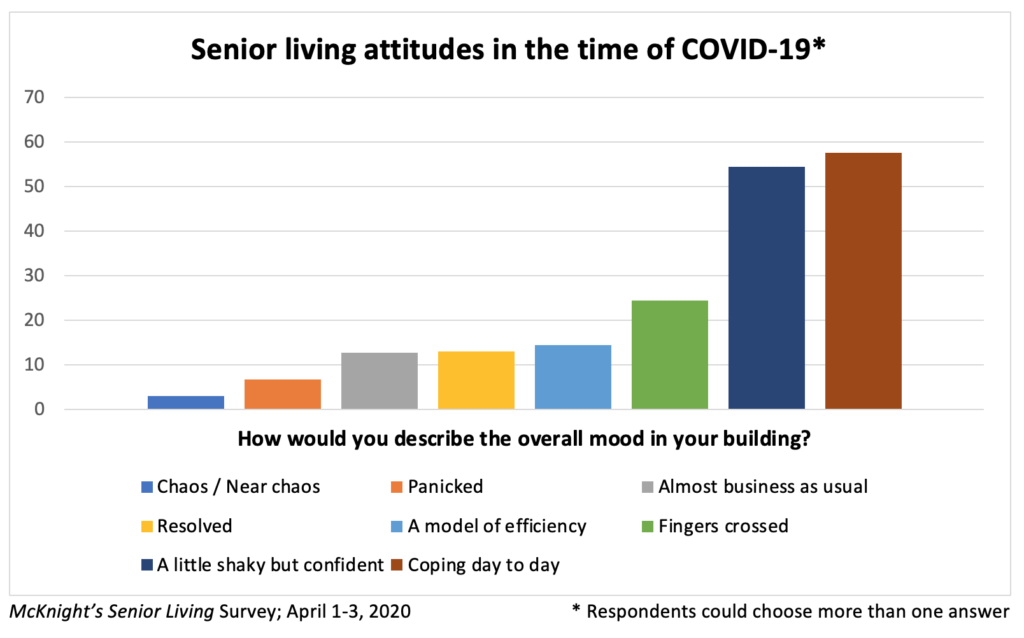
Senior living communities have much to manage when trying to prevent or contain COVID-19, but 56% of respondents to a new McKnight’s Senior Living survey said the overall mood in their building is “coping day to day.”
“This is new to everyone, so we are doing our best to stay a step ahead and be prepared,” one poll-taker said.
The next most selected choice from a list of survey options was “a little shaky, but confident overall,” picked by 54% of participants, who were permitted to select more than one option.
“This pandemic has sorely tested our overall processes, and we have generally been up to the task,” one respondent said.

McKnight’s Senior Living conducted the survey April 1 to 3 via email; 336 usable responses from administrators, owners, operators, health and wellness leaders, frontline caregivers and others working in independent living, assisted living, memory care and continuing care retirement communities were received. Seventy-seven percent of survey-takers said that no cases or presumed cases of COVID-19 had been detected among residents or workers in their communities.
The majority of respondents suggested that the pandemic response is being handled as well as can be expected in their buildings, with only 3% of participants describing the mood as “chaos / near chaos” and 7% using the word “panicked.”
“We’ve been able to keep the panic down by being completely prepared and ready for the unknown,” one poll-taker said. “Not being prepared and having to admit quickly only leads to mass-panic, call-ins and walk-outs.”
| McKnight’s Senior Living survey: 75% report PPE shortages in senior living communities |
Twenty-four percent of participants said the mood in their building is hopeful, with “fingers crossed.”
“Our team is solid and showing grace when one of us is struggling emotionally or needing a break,” one person said. “It’s been a real testament to the unity and teamwork we feel for each other. Many are jumping in to help other departments.”
“In the true sense of disaster-planning, we’re preparing for the worst but hoping for the best,” said another respondent. “We have leaned heavily on our peer connections for moral support, validation and guidance. Our residents and staff are resilient, but everyone shares a pretty high level of anxiety and worry that we try our best to stay positive.”
Speaking of staying positive, 14% of respondents said their building is “a model of efficiency and pride” and 13% said the mood where they work is “almost business as usual.”
“Our leadership was prepared and has handled this crisis effectively to keep residents and employees safe,” one person said.
“I am proud to be part of an organization that is preparing for this pandemic,” said another.
Thirteen percent of respondents said the mood in their building was “resolved.”
“The protocols we’ve put in place make me proud. Our staff is doing well after almost 20 days of these measures and resolved to make it through,” one participant said.
“Situations like we are facing today bring out the best in people. Many have found they have talents and resolve that they didn’t even know they had,” another said. “We are in this industry for a reason. COVID-19 reminds us of this reason.”
| McKnight’s Senior Living COVID-19 survey:
Operators cope with staffing issues by paying overtime, having managers fill in |
Some respondents, however, expressed unease or concern with COVID-19-related plans.
“We are waiting for a surge. It feels like the calm before the storm when we begin losing significant staff to disease or quarantine,” one respondent said. Another said the pandemic has been “mentally exhausting. Concerns of the unknown make days stressful.”
One person with a long tenure in the industry said, “I have been in several roles in senior living over 35 + years; feeling very uneasy about the situation at work and home.”
Communication key
Communication is a key to calming staff member nervousness and ensuring that the community response is appropriate, several respondents said.
“It is unnerving to have the rules changed almost daily, but with extra communication, we are managing to be good to each other and ourselves,” one person said.
“We are having daily senior leader meetings and communicating with residents and staff weekly via a newsletter,” said another.
“My company has been phenomenal in getting us information as it is available, getting us supplies and offering support as needed,” one respondent shared.
Citing a potential weakness, one person recommended “a mass communication process” to update families every day. “Staff is fielding hundreds of calls a day,” the participant said.
Some respondents’ thoughts already are on the future. “I hope we all learn from this experience and are ready / prepared for the next pandemic,” one said.



